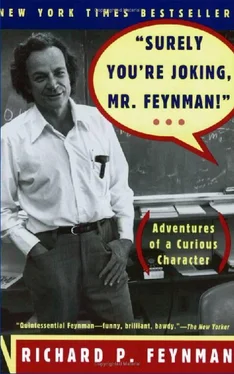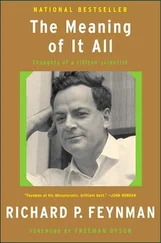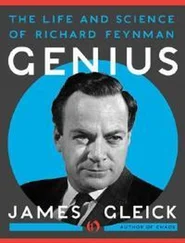One day he told me to stay after class. “Feynman,” he said, “you talk too much and you make too much noise. I know why. You’re bored. So I’m going to give you a book. You go up there in the back, in the corner, and study this book, and when you know everything that’s in this book, you can talk again.”
So every physics class, I paid no attention to what was going on with Pascal’s Law, or whatever they were doing. I was up in the back with this book: Advanced Calculus, by Woods. Bader knew I had studied Calculus for the Practical Man a little bit, so he gave me the real works—it was for a junior or senior course in college. It had Fourier series, Bessel functions, determinants, elliptic functions—all kinds of wonderful stuff that I didn’t know anything about.
That book also showed how to differentiate parameters under the integral sign—it’s a certain operation. It turns out that’s not taught very much in the universities; they don’t emphasize it. But I caught on how to use that method, and I used that one damn tool again and again. So because I was self-taught using that book, I had peculiar methods of doing integrals.
The result was, when guys at MIT or Princeton had trouble doing a certain integral, it was because they couldn’t do it with the standard methods they had learned in school. If it was contour integration, they would have found it; if it was a simple series expansion, they would have found it. Then I come along and try differentiating under the integral sign, and often it worked. So I got a great reputation for doing integrals, only because my box of tools was different from everybody else’s, and they had tried all their tools on it before giving the problem to me.
My father was always interested in magic and carnival tricks, and wanting to see how they worked. One of the things he knew about was mindreaders. When he was a little boy growing up in a small town called Patchogue, in the middle of Long Island, it was announced on advertisements posted all over that a mindreader was coming next Wednesday. The posters said that some respected citizens—the mayor, a judge, a banker—should take a five-dollar bill and hide it somewhere, and when the mindreader came to town, he would find it.
When he came, the people gathered around to watch him do his work. He takes the hands of the banker and the judge, who had hidden the five-dollar bill, and starts to walk down the street. He gets to an intersection, turns the corner, walks down another street, then another, to the correct house. He goes with them, always holding their hands, into the house, up to the second floor, into the right room, walks up to a bureau, lets go of their hands, opens the correct drawer, and there’s the five-dollar bill. Very dramatic!
In those days it was difficult to get a good education, so the mindreader was hired as a tutor for my father. Well, my father, after one of his lessons, asked the mindreader how he was able to find the money without anyone telling him where it was.
The mindreader explained that you hold onto their hands, loosely and as you move, you jiggle a little bit. You come to an intersection, where you can go forward, to the left, or to the right. You jiggle a little bit to the left, and if it’s incorrect, you feel a certain amount of resistance, because they don’t expect you to move that way. But when you move in the right direction, because they think you might be able to do it, they give way more easily and there’s no resistance. So you must always be jiggling a little bit, testing out which seems to be the easiest way.
My father told me the story and said he thought it would still take a lot of practice. He never tried it himself.
Later, when I was doing graduate work at Princeton, I decided to try it on a fellow named Bill Woodward. I suddenly announced that I was a mindreader, and could read his mind. I told him to go into the “laboratory”—a big room with rows of tables covered with equipment of various kinds, with electric circuits, tools, and junk all over the place—pick out a certain object, somewhere, and come out. I explained, “Now I’ll read your mind and take you right up to the object.”
He went into the lab, noted a particular object, and came out. I took his hand and started jiggling. We went down this aisle, then that one, right to the object. We tried it three times. One time I got the object right on—and it was in the middle of a whole bunch of stuff. Another time I went to the right place but missed the object by a few inches—wrong object. The third time, something went wrong. But it worked better than I thought. It was very easy.
Some time after that, when I was about twenty-six or so, my father and I went to Atlantic City where they had various carnival things going on outdoors. While my father was doing some business, I went to see a mindreader. He was seated on the stage with his back to the audience, dressed in robes and wearing a great big turban. He had an assistant, a little guy who was running around through the audience, saying things like, “Oh, Great Master, what is the color of this pocketbook?”
“Blue!” says the master.
“And oh, Illustrious Sir, what is the name of this woman?”
“Marie!”
Some guy gets up: “What’s my name?”
“Henry.”
I get up and say, “What’s my name?”
He doesn’t answer. The other guy was obviously a confederate, but I couldn’t figure out how the mindreader did the other tricks, like telling the color of the pocketbook. Did he wear earphones underneath the turban?
When I met up with my father, I told him about it. He said, “They have a code worked out, but I don’t know what it is. Let’s go back and find out.”
We went back to the place, and my father said to me, “Here’s fifty cents. Go get your fortune read in the booth back there, and I’ll see you in half an hour.”
I knew what he was doing. He was going to tell the man a story, and it would go smoother if his son wasn’t there going, “Ooh, ooh!” all the time. He had to get me out of the way.
When he came back he told me the whole code: “Blue is ‘Oh, Great Master,’ Green is ‘Oh, Most Knowledgeable One,’ ” and so forth. He explained, “I went up to him, afterwards, and told him I used to do a show in Patchogue, and we had a code, but it couldn’t do many numbers, and the range of colors was shorter. I asked him, ‘How do you carry so much information?’ ”
The mindreader was so proud of his code that he sat down and explained the whole works to my father. My father was a salesman. He could set up a situation like that. I can’t do stuff like that.
When I was a kid I had a “lab.” It wasn’t a laboratory in the sense that I would measure, or do important experiments.
Instead, I would play: I’d make a motor, I’d make a gadget that would go off when something passed a photocell. I’d play around with selenium; I was piddling around all the time. I did calculate a little bit for the lamp bank, a series of switches and bulbs I used as resistors to control voltages. But all that was for application. I never did any laboratory kind of experiments.
I also had a microscope and loved to watch things under the microscope. It took patience: I would get something under the microscope and I would watch it interminably. I saw many interesting things, like everybody sees—a diatom slowly making its way across the slide, and so on.
One day I was watching a paramecium and I saw something that was not described in the books I got in school—in college, even. These books always simplify things so the world will be more like they want it to be: When they’re talking about the behavior of animals, they always start out with, “The paramecium is extremely simple; it has a simple behavior. It turns as its slipper shape moves through the water until it hits something, at which time it recoils, turns through an angle, and then starts out again.”
Читать дальше












